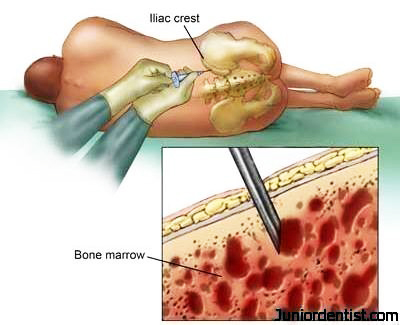|
In adults, all blood cells are made in the bone marrow, so cancers of the blood are also cancers of the bone marrow.
Blood and Bone Marrow Cancers
In adults, all blood cells are made in the bone marrow, so cancers of the blood are also cancers of the bone marrow. There are several different types of blood and bone marrow cancer; some are more serious than others.
Here is a brief description of the most common blood and bone marrow cancers.
Acute Myeloid Leukaemia (AML)is a serious and aggressive cancer of white blood cells that is treated in hospital by chemotherapy. Without treatment, patients with this disease usually die within months. A considerable proportion of people can be cured of this disease with modern treatment. Treatment usually requires several months. Some patients may need treatment with a donor bone marrow transplant.
Acute Lymphoblastic Leukaemia (ALL) is less common than AML in adults but is equally serious and aggressive (in children, Acute lymphoblastic leukaemia is more common than AML and is usually curable with modern chemotherapy). It is a cancer of white blood cells. Treatment is improving all the time and currently involves a combination of chemotherapy, radiation therapy and sometimes donor bone marrow transplantation. Chemotherapy and radiation therapy are carried out ; donor bone marrow transplantation, when necessary, is carried out.
Chronic Myeloid Leukaemia (also called chronic myelogenous leukaemia or CML) is different from acute myeloid leukaemia because patients do not usually need to be admitted to the hospital for treatment. Recently there have been major advances in the treatment of this disease and many people can now be treated at home with tablets and can continue to live a normal life while being treated. However the recent advances are so new that, so far, we are not sure whether CML can be cured with tablets, or whether they simply keep the disease under control.
Some patients cannot be treated with tablet treatment and other options including donor bone marrow transplantation are available for some people.
Chronic Lymphocytic Leukaemia (CLL) is a common type of cancer. It is unusual in that in some people, it causes no problems and requires no treatment. Other people experience some symptoms which require occasional treatment to keep the disease under control. Finally some people have more serious symptoms which can require more frequent and intensive treatment. It cannot usually be cured but often can be kept under control for many years.

Multiple Myeloma is another unusual type of bone marrow cancer. In some people it is more aggressive than others and treatment varies from person to person. For many people the disease can be kept under control for several years. In some people no treatment is required for several months or even years.
Treatment can consist of a combination of chemotherapy, radiation therapy and for some people, autologous or “self” peripheral blood stem cell transplant. People sometimes also need treatment with other, non-chemotherapy, drugs.
Leukemia -
• Leukemia is a cancer of the blood cells.
• While the exact cause(s) of leukemia is not known, risk factors have been identified.
• Leukemias are grouped by how quickly the disease develops (acute or chronic) as well as by the type of blood cell that is affected (lymphocytes or myelocytes). The four main types of leukemia include acute lymphocytic leukemia (ALL), chronic lymphocytic leukemia (CLL), acute myelocytic leukemia (AML), and chronic myelocytic leukemia (CML).
• People with leukemia are at significantly increased risk for developing infections, anemia, and bleeding. Other symptoms and signs include easy bruising, weight loss, night sweats, and unexplained fevers.
• The diagnosis of leukemia is supported by findings of the medical history and examination, and examining blood and bone marrow samples under a microscope.
• Treatment of leukemia depends on the type of leukemia, certain features of the leukemia cells, the extent of the disease, and prior history of treatment, as well as the age and health of the patient.
• Most patients with leukemia are treated with chemotherapy. Some patients also may have radiation therapy and/or bone marrow transplantation.
• There is no known way to prevent leukemia.
• The prognosis of leukemia depends upon several factors, including the patient's age, the type of leukemia, and the extent to which the cancer has spread.
Anemia:
• Anemia is a medical condition in which the red blood cell count or hemoglobin is less than normal.
• For men, anemia is typically defined as hemoglobin level of less than 13.5 gram/100 ml and in women as hemoglobin of less than 12.0 gram/100 ml.
• Anemia is caused by either a decrease in production of red blood cells or hemoglobin, or an increase in loss or destruction of red blood cells.
• Some patients with anemia have no symptoms. Others may feel tired, easily fatigued, appear pale, a feeling of heart racing, short of breath, and/or worsening of heart problems.
• Anemia can be detected by a simple blood test called a complete blood cell count (CBC).
• The treatment of the anemia varies greatly and very much depends on the particular cause. |